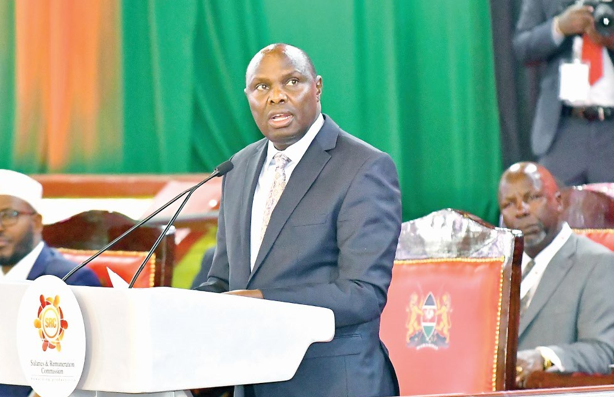Suspension order on branding hits SMEs

A State directive issued by Head of Public Service Felix Koskei suspending the procurement and printing of corporate wear and branded merchandise, has hit the printing and branding industry hard.
The move, part of President William Ruto’s Bottom-Up Economic Transformation Agenda (BETA), aims to rationalise non-priority expenditures under fiscal consolidation efforts.
However, the directive posted in March 2024, has left many businesses, especially small and medium-sized enterprises (SMEs) in the printing and branding sector, reeling from the lost opportunities from the government which is among the major consumers.
For years, government contracts have been a lifeline for printers and branding companies. Orders for branded items such as t-shirts, diaries, calendars, and promotional merchandise were not only lucrative but also provided steady income streams for these businesses. Now, the sudden halt has thrown many into financial uncertainty.
Peninah Mwangi, the owner of a small printing shop in Nairobi, shared how the directive has affected her operations. “In the past, government orders made up about 60 per cent of our annual revenue. We would start the year with bulk orders for branded diaries and calendars, and later fulfil contracts for promotional items during events and campaigns. This year, we’ve had to let go of half our staff because the orders have completely dried up,” she said.
Struggling to remain afloat
Peninah added that without government tenders, his business will struggle to stay afloat, as private sector demand is insufficient to cover operating costs.
Similarly, larger players in the industry are feeling the pinch. A branding firm in Mombasa that specialises in corporate merchandise saw a drastic reduction in orders after the circular was issued.
The firm, which typically employed over 50 workers during peak seasons, has now scaled down to a skeleton staff.
“We used to supply branded umbrellas, T-shirts, and banners for various state corporations during public holidays and official functions. These were significant projects that kept us busy throughout the year. Now, the machines are idle, and we’re considering renting out some of our equipment just to meet overhead costs,” said the firm’s operations manager, John Ochieng.
Even suppliers of raw materials have been affected. Jane Wanjiru, who runs a business selling printing paper, ink, and branding materials, said her sales have plummeted during this time compared to last year.
“Printing businesses used to place bulk orders, especially at the start of the financial year. Now, they are only buying what they need for small jobs, and the volume is nowhere near what it used to be,” he explained. He expressed concern that if the situation continues, he may lay off more workers since branding has also gone online.
Digital options abound
The rise of online marketing has significantly impacted traditional printing businesses, especially in the areas of branding.
With the shift to digital platforms, many businesses are now prioritising online marketing strategies over physical branding materials like brochures, banners, and printed merchandise. This change has reduced the demand for traditional printing services, cutting into the revenue streams of printing companies.
E-commerce platforms and social media have made it easier and more cost-effective for businesses to create, distribute, and customise their branding materials digitally.
The directive has also impacted freelance graphic designers whose income will dwindle. Kevin Otieno, a freelance designer based in Nairobi, explained how the shift will hit his finances. “Most of my projects involved creating designs for government tenders, such as brochures, banners, and branded items. With those jobs gone, I’ve had to rely on smaller gigs from individuals and small businesses, but the competition is stiff, and the pay is lower.”
Fiscal consolidation
While fiscal consolidation is necessary, the blanket suspension of branded merchandise procurement has disproportionately affected small businesses that depend on government contracts. Many feel that a more targeted approach, such as prioritising local suppliers or limiting the scope of branded items, could have mitigated the impact.
According to Koskei’s circular, the directive aligns with President Ruto’s macroeconomic strategy of enhancing revenue mobilisation and cutting nonessential expenditure.
Parastatals were also instructed to slash their budgets by 30 per cent, further tightening the purse.












